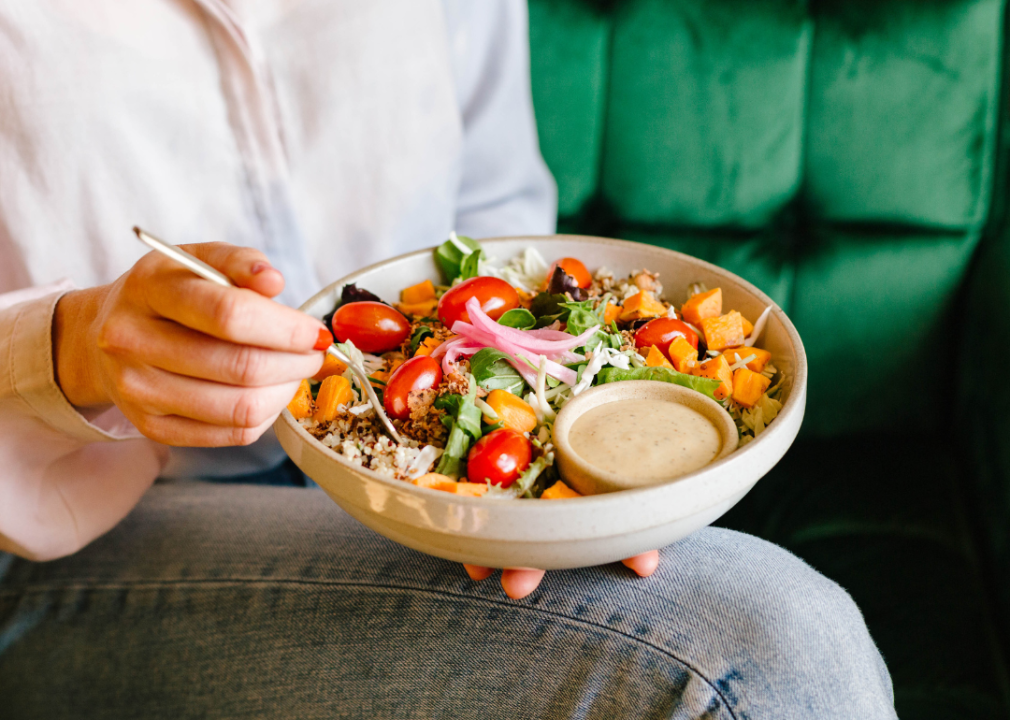How plant-based diets have been shown to affect gut health

Thistle
How plant-based diets have been shown to affect gut health
A person eats a bowl of assorted vegetables .
Your body is home to a vast ecosystem of trillions of microorganisms, mainly in the large intestine. All those bacteria, viruses, fungi, and parasites make up what’s called your gut microbiome. They primarily exist in a symbiotic relationship with you, their host, helping break down cellulose fiber, supplying essential nutrients, and synthesizing critical vitamins. Thistle researched how plant-based diets affect the health of the gut microbiome.
New studies and funding and a COVID-19 pandemic-era increase in consumers looking for additional health protection from foods have spurred a renewed interest in the ancient arts of fermentation and the prebiotic and probiotic foods that, according to a review of scientific studies published in peer-reviewed journals, can support the microbiome and promote overall health.
Research has shown that the microbiome is involved in optimizing a person’s daily function. The microorganisms break down food compounds into components and even reassemble pieces into amino acids and vitamins, such as B vitamins and vitamin K.
Starches and fibers, which don’t easily break down in the small intestine, travel to the large intestine, where they’re fermented into beneficial compounds that play a role in how muscles operate—and perhaps help prevent some chronic diseases.
The microbiome plays such an important role that medical professionals consider it almost on par with other vital organs like the liver and kidneys. A person’s microbiome can improve their health or place them at greater risk of disease.
What’s in a person’s microbiome is first shaped by their DNA, then by their contact with microorganisms coming from the birth canal during delivery and through breast milk. Later in life, environmental factors and diet become the most significant determinants of a person’s microbiome composition.
How plant-based diets affect gut health
What you eat directly affects the composition of your gut biome. The two major types of gut bacteria are known as bacteroidetes and firmicutes. Each flourishes when it gets its favorite food.
Bacteroidetes thrive on plant-based, fiber-rich whole foods, while firmicutes love to munch on animal proteins. Eat more plants and whole foods, and you’ll promote the growth of bacteroidetes. Eat more animal proteins, and you’ll encourage the development of firmicutes.
Research suggests that people with more animal-protein-loving bacteria than plant-loving bacteria tend to have a higher body mass index and, therefore, are at higher risk of heart disease, high blood pressure, and other chronic conditions.
In addition, people with higher levels of firmicutes may also be able to absorb more energy from their food, which could lead to gaining weight.
Plant-based diets, by contrast, promote the growth of bacteria species that consume plant-based fiber and turn them into short-chain fatty acids. Those compounds are energy sources and can reduce inflammation, improve the immune system, regulate digestive functions, and help protect brain function.
The polyphenols in plant foods also increase the amount of Bifidobacterium and Lactobacillus bacteria. Known as “probiotics,” they supplement the body’s natural microbial environment. These bacteria help fight against pathogens and inflammations and protect the cardiovascular system.
Other foods that support the microbiome
In addition to probiotics, there are compounds called “prebiotics,” which act like food for the beneficial microbes. They are most prevalent in certain raw vegetables, such as garlic, seaweed, bananas, onions, leeks, dandelion greens, Jerusalem artichokes, and asparagus. Whole grains, vegetables, and beans are also excellent sources of prebiotic fiber.
Other foods can also support the gut biome, like fermented products, which host their own microorganisms. These interact positively with the gut biome and promote overall microbe diversity. Fermented foods such as kombucha, kimchi, sauerkraut, kefir, miso, and aged and raw cheeses are excellent sources of these microorganisms.
Story editing by Jeff Inglis. Copy editing by Kristen Wegrzyn.
![]()